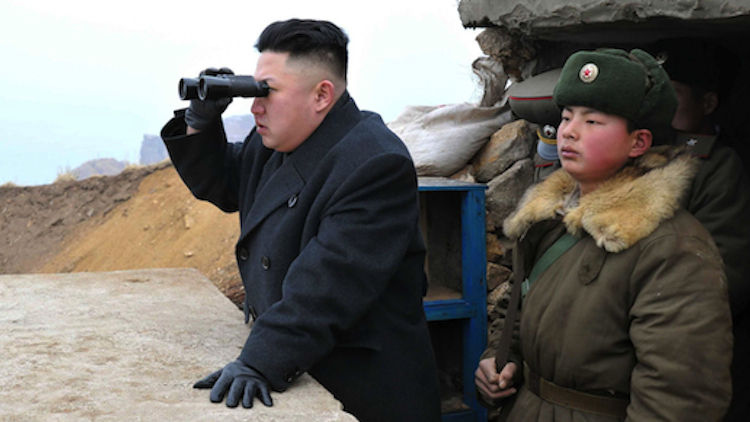Editorial: What will it take to kick North Korea out of the U.N.?
With the abdication of the U.S. as the world’s policeman, there is no authority left to take on a pariah state
In this March 7, 2013 photo released by the Korean Central News Agency (KCNA) and distributed March 8, 2013 by the Korea News Service, North Korean leader Kim Jong Un, center, uses binoculars to look at the South’s territory from an observation post at the military unit on Jangjae islet, located in the southernmost part of the southwestern sector of North Korea’s border with South Korea. Seven years of U.N. sanctions against North Korea have done nothing to derail Pyongyang’s drive for a nuclear weapon capable of hitting the United States. They may have even bolstered the Kim family by giving their propaganda maestros ammunition to whip up anti-U.S. sentiment and direct attention away from government failures. (AP Photo/KCNA via KNS) JAPAN OUT UNTIL 14 DAYS AFTER THE DAY OF TRANSMISSION
Share
It is testimony to suffering and terror on a massive scale. This week the United Nations’ commission of inquiry on human rights in the Democratic People’s Republic of Korea released an exhaustive examination of conditions within the Hermit Kingdom. Following numerous public hearings and nearly a year of investigation, the 372-page report provides a detailed look at the horrors inflicted on the people of North Korea by their own government.
“Systematic, widespread and gross human rights violations have been, and are being, committed in [North] Korea,” it says, referring directly to the dictatorship of Kim Jong Un. “The gravity, scale and nature of these violations reveal a state that does not have any parallel in the contemporary world.”
Separate chapters detail numerous examples of state-sanctioned torture, rape and murder; grotesque violations of the freedoms of thought, expression and religion; discrimination on the basis of social class, gender and disability; the use of starvation as a means of social control; widespread abductions of Japanese and South Korean citizens for intelligence purposes; as well as arbitrary imprisonment on a massive scale.
The political prison camp archipelago is estimated to contain up to 120,000 people, all of whom face a shockingly high death rate. One prison camp escapee told the commission that his job included burning the bodies of the dead and using the remains as fertilizer. A mother was forced to drown her own baby because the father may have been a foreigner, in violation of racial purity laws. And due to its dysfunctional political and economic structure, the country is utterly incapable of feeding itself: a third of the population is severely malnourished, wild food such as grasses and rodents comprise a significant portion of everyday food intake. Even within the army, starvation is so prevalent many soldiers survive solely on food stolen from poor farmers.
China, North Korea’s international guardian, is also strongly criticized for its complicity in returning refugees to North Korea without regard for their human rights.
At a press conference to introduce the findings, lead UN investigator Michael Kirby, a retired Australian judge, acknowledged “many parallels” between North Korea and Nazi Germany. What’s different today, says Kirby, is that “there will be no excusing a failure of action because we didn’t know.”
Of course the world has long known about the conditions under the leadership of Kim Jong Un and his father, Kim Jong Il. Everything in this week’s UN report has been previously described by numerous NGOs, the U.S. State Department and countless other sources. As for the prospect of effective action against North Korea—don’t hold your breath.
The commission includes several pages of stern demands on the North Korean government, including that it open up its prison camp system, protect various fundamental freedoms and cease murdering its own citizens. It also calls on China to stop returning asylum seekers. None of this is about to happen, for obvious reasons. (China would rather share a border with a murderous dictatorship, it seems, than risk political instability.)
The report also makes many high-minded recommendations for the rest of the world. The UN Security Council should refer North Korea’s leadership to the International Criminal Court (ICC) for prosecution. There’s a call for a permanent database of ongoing rights violations and periodic reports on how the above recommendations are being implemented. (However, further economic sanctions, as have been effective against Iran, are discouraged as this will make living conditions within the country worse.) The depressing reality is that nothing in North Korea is likely to change because of this report.
The ICC is powerless to prosecute the leader of a country that refuses to participate, and China’s permanent veto on the Security Council effectively insulates North Korea from anything the UN or the ICC might attempt with Kim Jong Un. As for calls for new reports and databases, we already know what’s rotten in North Korea and why.
Perhaps the most absurd aspect of the UN report is that it cannot even bring itself to recommend the expulsion of North Korea from the UN itself. Here is a country actively murdering its own citizens on a scale unparalleled in the postwar era; why is it still a member of the UN? Surely this ought to be the first step for any action-minded UN report writer.
The uncomfortable truth revealed herein is that international human rights have always been defined by military power and realpolitik rather than the pursuit of justice in any pure sense. And with the abdication of the United States as the world’s policeman, there is simply no authority left with the muscle and moral standing to take on a pariah state with powerful friends.
By all means we should bear witness to the horrors ongoing inside North Korea. But unless the people themselves rise up, or the outside world takes concrete steps to remove the current regime, these horrors will continue to pile up.
